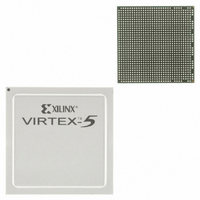XC5VLX85-2FF676I Xilinx Inc, XC5VLX85-2FF676I Datasheet - Page 89

XC5VLX85-2FF676I
Manufacturer Part Number
XC5VLX85-2FF676I
Description
FPGA Virtex®-5 Family 82944 Cells 65nm (CMOS) Technology 1V 676-Pin FCBGA
Manufacturer
Xilinx Inc
Series
Virtex™-5 LXr
Datasheets
1.XC5VLX30-1FFG324C.pdf
(91 pages)
2.XC5VLX30-1FFG324C.pdf
(13 pages)
3.XC5VLX30-1FFG324C.pdf
(385 pages)
Specifications of XC5VLX85-2FF676I
Package
676FCBGA
Family Name
Virtex®-5
Device Logic Units
82944
Typical Operating Supply Voltage
1 V
Maximum Number Of User I/os
440
Ram Bits
3538944
Number Of Logic Elements/cells
82944
Number Of Labs/clbs
6480
Total Ram Bits
3538944
Number Of I /o
440
Voltage - Supply
0.95 V ~ 1.05 V
Mounting Type
Surface Mount
Operating Temperature
-40°C ~ 100°C
Package / Case
676-BBGA, FCBGA
Lead Free Status / RoHS Status
Contains lead / RoHS non-compliant
For Use With
HW-AFX-FF676-500-G - BOARD DEV VIRTEX 5 FF676
Number Of Gates
-
Lead Free Status / RoHS Status
Contains lead / RoHS non-compliant
Available stocks
Company
Part Number
Manufacturer
Quantity
Price
- XC5VLX30-1FFG324C PDF datasheet
- XC5VLX30-1FFG324C PDF datasheet #2
- XC5VLX30-1FFG324C PDF datasheet #3
- Current page: 89 of 385
- Download datasheet (14Mb)
Phase-Locked Loops (PLLs)
Introduction
Virtex-5 FPGA User Guide
UG190 (v5.3) May 17, 2010
The clock management tile (CMT) in Virtex-5 FPGAs includes two DCMs and one PLL.
There are dedicated routes within a CMT to couple together various components. Each
block within the tile can be treated separately, however, there exists a dedicated routing
between blocks creating restrictions on certain connections. Using these dedicated routes
frees up global resources for other design elements. Additionally, the use of local routes
within the CMT provides an improved clock path because the route is handled locally,
reducing chances for noise coupling.
The CMT diagram
various clock input sources and the DCM-to-PLL and PLL-to-DCM dedicated routing. The
six (total) PLL output clocks are muxed into a single clock signal for use as a reference clock
to the DCMs. Two output clocks from the PLL can drive the DCMs. These two clocks are
100% independent. PLL output clock 0 could drive DCM1 while PLL output clock 1 could
drive DCM2. Each DCM output can be muxed into a single clock signal for use as a
reference clock to the PLL. Only one DCM can be used as the reference clock to the PLL at
any given time. A DCM can not be inserted in the feedback path of the PLL. Both the PLLs
or DCMs of a CMT can be used separately as stand-alone functions. The outputs from the
PLL are not spread spectrum.
(Figure
www.xilinx.com
3-1) shows a high-level view of the connection between the
Chapter 3
89
Related parts for XC5VLX85-2FF676I
Image
Part Number
Description
Manufacturer
Datasheet
Request
R

Part Number:
Description:
IC FPGA VIRTEX-5 85K 676FBGA
Manufacturer:
Xilinx Inc
Datasheet:

Part Number:
Description:
IC FPGA VIRTEX-5 85K 676FBGA
Manufacturer:
Xilinx Inc
Datasheet:

Part Number:
Description:
IC FPGA VIRTEX-5 85K 1153FBGA
Manufacturer:
Xilinx Inc
Datasheet:

Part Number:
Description:
IC FPGA VIRTEX-5 85K 1153FBGA
Manufacturer:
Xilinx Inc
Datasheet:

Part Number:
Description:
IC FPGA VIRTEX-5 85K 676FBGA
Manufacturer:
Xilinx Inc
Datasheet:

Part Number:
Description:
IC FPGA VIRTEX-5 85K 676FBGA
Manufacturer:
Xilinx Inc
Datasheet:

Part Number:
Description:
IC FPGA VIRTEX-5 85K 676FBGA
Manufacturer:
Xilinx Inc
Datasheet:

Part Number:
Description:
IC FPGA VIRTEX-5 85K 676FBGA
Manufacturer:
Xilinx Inc
Datasheet:

Part Number:
Description:
IC FPGA VIRTEX-5 85K 1153FBGA
Manufacturer:
Xilinx Inc
Datasheet:

Part Number:
Description:
IC FPGA VIRTEX-5 85K 676FBGA
Manufacturer:
Xilinx Inc
Datasheet:

Part Number:
Description:
IC FPGA VIRTEX-5 85K 676FBGA
Manufacturer:
Xilinx Inc
Datasheet:

Part Number:
Description:
IC FPGA VIRTEX-5 85K 676FBGA
Manufacturer:
Xilinx Inc
Datasheet:

Part Number:
Description:
IC FPGA VIRTEX-5 85K 1153FBGA
Manufacturer:
Xilinx Inc
Datasheet:

Part Number:
Description:
IC FPGA VIRTEX-5 85K 1153FBGA
Manufacturer:
Xilinx Inc
Datasheet:

Part Number:
Description:
IC FPGA VIRTEX-5 85K 1153FBGA
Manufacturer:
Xilinx Inc
Datasheet:











